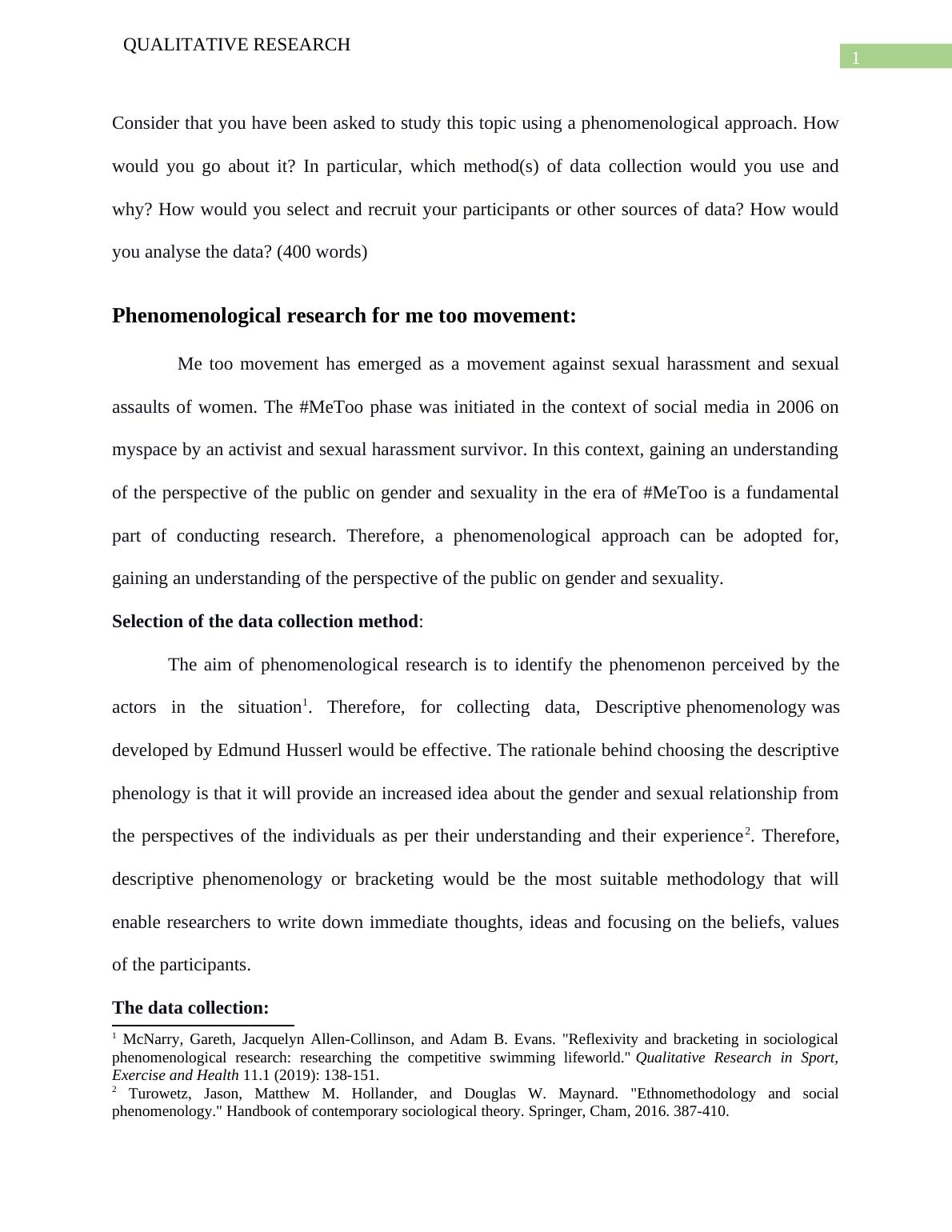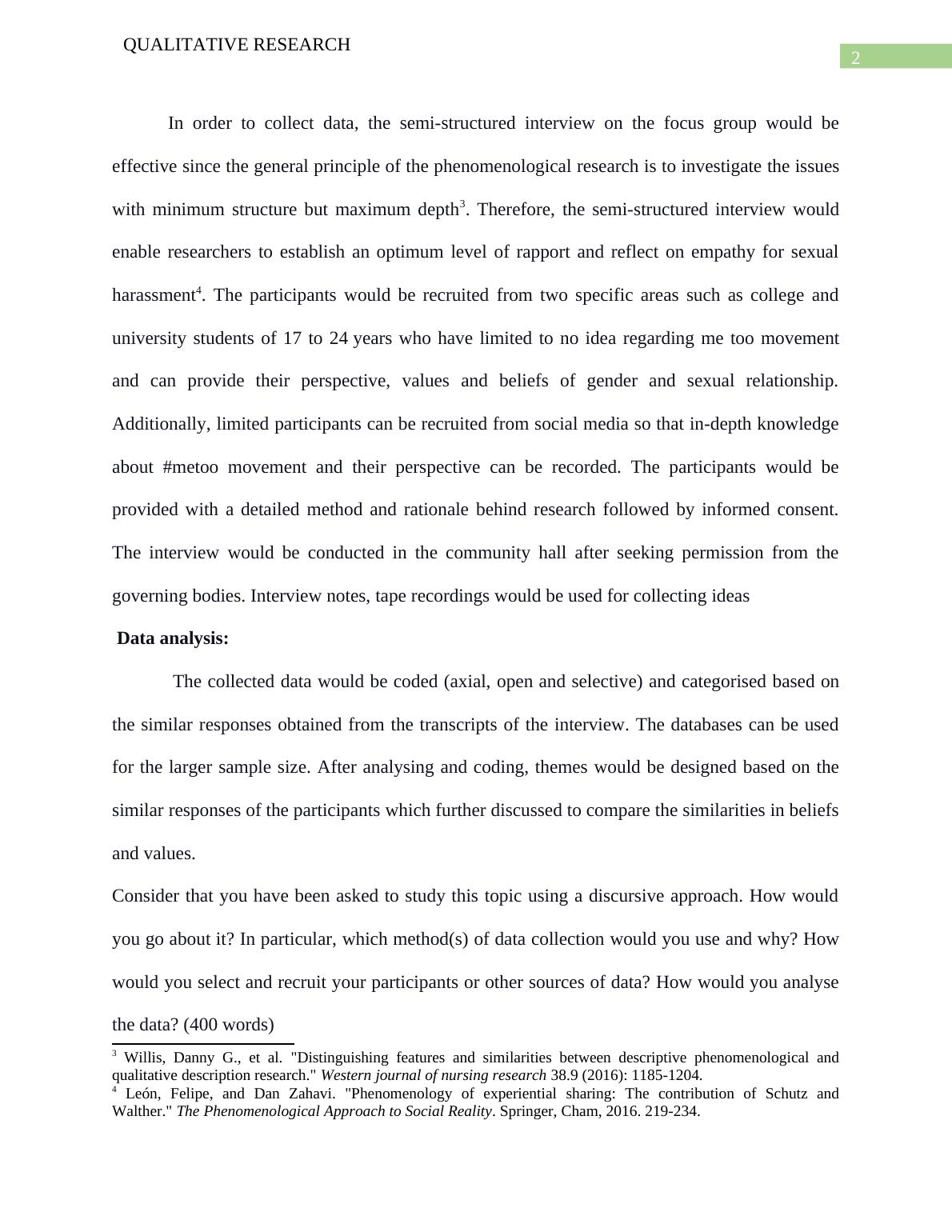Qualitative Research : Phenomenological Research for Me Too Movement:
Added on 2022-08-31
9 Pages2071 Words27 Views
Running head: QUALITATIVE RESEARCH
QUALITATIVE RESEARCH
Name of the student:
Name of the university:
Author note:
QUALITATIVE RESEARCH
Name of the student:
Name of the university:
Author note:

QUALITATIVE RESEARCH
1
Consider that you have been asked to study this topic using a phenomenological approach. How
would you go about it? In particular, which method(s) of data collection would you use and
why? How would you select and recruit your participants or other sources of data? How would
you analyse the data? (400 words)
Phenomenological research for me too movement:
Me too movement has emerged as a movement against sexual harassment and sexual
assaults of women. The #MeToo phase was initiated in the context of social media in 2006 on
myspace by an activist and sexual harassment survivor. In this context, gaining an understanding
of the perspective of the public on gender and sexuality in the era of #MeToo is a fundamental
part of conducting research. Therefore, a phenomenological approach can be adopted for,
gaining an understanding of the perspective of the public on gender and sexuality.
Selection of the data collection method:
The aim of phenomenological research is to identify the phenomenon perceived by the
actors in the situation1. Therefore, for collecting data, Descriptive phenomenology was
developed by Edmund Husserl would be effective. The rationale behind choosing the descriptive
phenology is that it will provide an increased idea about the gender and sexual relationship from
the perspectives of the individuals as per their understanding and their experience2. Therefore,
descriptive phenomenology or bracketing would be the most suitable methodology that will
enable researchers to write down immediate thoughts, ideas and focusing on the beliefs, values
of the participants.
The data collection:
1 McNarry, Gareth, Jacquelyn Allen-Collinson, and Adam B. Evans. "Reflexivity and bracketing in sociological
phenomenological research: researching the competitive swimming lifeworld." Qualitative Research in Sport,
Exercise and Health 11.1 (2019): 138-151.
2 Turowetz, Jason, Matthew M. Hollander, and Douglas W. Maynard. "Ethnomethodology and social
phenomenology." Handbook of contemporary sociological theory. Springer, Cham, 2016. 387-410.
1
Consider that you have been asked to study this topic using a phenomenological approach. How
would you go about it? In particular, which method(s) of data collection would you use and
why? How would you select and recruit your participants or other sources of data? How would
you analyse the data? (400 words)
Phenomenological research for me too movement:
Me too movement has emerged as a movement against sexual harassment and sexual
assaults of women. The #MeToo phase was initiated in the context of social media in 2006 on
myspace by an activist and sexual harassment survivor. In this context, gaining an understanding
of the perspective of the public on gender and sexuality in the era of #MeToo is a fundamental
part of conducting research. Therefore, a phenomenological approach can be adopted for,
gaining an understanding of the perspective of the public on gender and sexuality.
Selection of the data collection method:
The aim of phenomenological research is to identify the phenomenon perceived by the
actors in the situation1. Therefore, for collecting data, Descriptive phenomenology was
developed by Edmund Husserl would be effective. The rationale behind choosing the descriptive
phenology is that it will provide an increased idea about the gender and sexual relationship from
the perspectives of the individuals as per their understanding and their experience2. Therefore,
descriptive phenomenology or bracketing would be the most suitable methodology that will
enable researchers to write down immediate thoughts, ideas and focusing on the beliefs, values
of the participants.
The data collection:
1 McNarry, Gareth, Jacquelyn Allen-Collinson, and Adam B. Evans. "Reflexivity and bracketing in sociological
phenomenological research: researching the competitive swimming lifeworld." Qualitative Research in Sport,
Exercise and Health 11.1 (2019): 138-151.
2 Turowetz, Jason, Matthew M. Hollander, and Douglas W. Maynard. "Ethnomethodology and social
phenomenology." Handbook of contemporary sociological theory. Springer, Cham, 2016. 387-410.

QUALITATIVE RESEARCH
2
In order to collect data, the semi-structured interview on the focus group would be
effective since the general principle of the phenomenological research is to investigate the issues
with minimum structure but maximum depth3. Therefore, the semi-structured interview would
enable researchers to establish an optimum level of rapport and reflect on empathy for sexual
harassment4. The participants would be recruited from two specific areas such as college and
university students of 17 to 24 years who have limited to no idea regarding me too movement
and can provide their perspective, values and beliefs of gender and sexual relationship.
Additionally, limited participants can be recruited from social media so that in-depth knowledge
about #metoo movement and their perspective can be recorded. The participants would be
provided with a detailed method and rationale behind research followed by informed consent.
The interview would be conducted in the community hall after seeking permission from the
governing bodies. Interview notes, tape recordings would be used for collecting ideas
Data analysis:
The collected data would be coded (axial, open and selective) and categorised based on
the similar responses obtained from the transcripts of the interview. The databases can be used
for the larger sample size. After analysing and coding, themes would be designed based on the
similar responses of the participants which further discussed to compare the similarities in beliefs
and values.
Consider that you have been asked to study this topic using a discursive approach. How would
you go about it? In particular, which method(s) of data collection would you use and why? How
would you select and recruit your participants or other sources of data? How would you analyse
the data? (400 words)
3 Willis, Danny G., et al. "Distinguishing features and similarities between descriptive phenomenological and
qualitative description research." Western journal of nursing research 38.9 (2016): 1185-1204.
4 León, Felipe, and Dan Zahavi. "Phenomenology of experiential sharing: The contribution of Schutz and
Walther." The Phenomenological Approach to Social Reality. Springer, Cham, 2016. 219-234.
2
In order to collect data, the semi-structured interview on the focus group would be
effective since the general principle of the phenomenological research is to investigate the issues
with minimum structure but maximum depth3. Therefore, the semi-structured interview would
enable researchers to establish an optimum level of rapport and reflect on empathy for sexual
harassment4. The participants would be recruited from two specific areas such as college and
university students of 17 to 24 years who have limited to no idea regarding me too movement
and can provide their perspective, values and beliefs of gender and sexual relationship.
Additionally, limited participants can be recruited from social media so that in-depth knowledge
about #metoo movement and their perspective can be recorded. The participants would be
provided with a detailed method and rationale behind research followed by informed consent.
The interview would be conducted in the community hall after seeking permission from the
governing bodies. Interview notes, tape recordings would be used for collecting ideas
Data analysis:
The collected data would be coded (axial, open and selective) and categorised based on
the similar responses obtained from the transcripts of the interview. The databases can be used
for the larger sample size. After analysing and coding, themes would be designed based on the
similar responses of the participants which further discussed to compare the similarities in beliefs
and values.
Consider that you have been asked to study this topic using a discursive approach. How would
you go about it? In particular, which method(s) of data collection would you use and why? How
would you select and recruit your participants or other sources of data? How would you analyse
the data? (400 words)
3 Willis, Danny G., et al. "Distinguishing features and similarities between descriptive phenomenological and
qualitative description research." Western journal of nursing research 38.9 (2016): 1185-1204.
4 León, Felipe, and Dan Zahavi. "Phenomenology of experiential sharing: The contribution of Schutz and
Walther." The Phenomenological Approach to Social Reality. Springer, Cham, 2016. 219-234.

End of preview
Want to access all the pages? Upload your documents or become a member.
Related Documents
Impact of reward system on employee motivation - Case Studylg...
|59
|14598
|28
Influence of Social Media Marketing on Airlineslg...
|11
|3028
|484
Effectiveness of Corporate Social Responsibility by Firmslg...
|58
|13568
|196